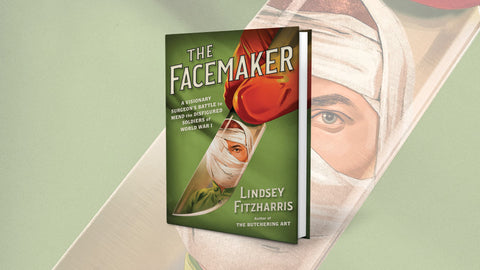
Book Review: ‘The Facemaker’ by Lindsey Fitzharris
With high-explosive artillery and sweeping machine gun fire, World War I changed the face of combat. It also destroyed the faces of tens of thousands of soldiers. A visionary surgeon, Dr. Harold Gillies of New Zealand, sought to repair that damage with a revolution in reconstructive surgical techniques.
Lindsey Fitzharris’ The Facemaker examines the clinical care and compassion rendered by a man widely considered the father of modern plastic surgery. Gillies and an international team of surgeons worked tirelessly during World War I to provide men who had shattered—and even missing—faces with facsimiles on which society would not turn its back. In the process he restored his patients’ emotional well-being and self-worth.
The technological innovations that made World War I so deadly also caused horrible wounds. While legs and arms could be replaced, damage to the head was brutal. “Wounds to the face could be especially traumatic,” Fitzharris writes. “Noses were blown off, jaws were shattered, tongues were torn out and eyeballs were dislodged. In some cases entire faces were obliterated.”
Repairing such destruction was beyond the scope of medical science at the time. Through painstaking efforts over countless surgeries Gillies developed new ways to fix smashed faces and help horribly disfigured men achieve some semblance of normalcy in their shattered lives. The innovative surgeon and his team worked—often around the clock—to restore faces with then-untried techniques still in use today. They found new ways to restore bone, regrow appendages, realign teeth and transplant tissue. Gillies became expert at harvesting cartilage and tendons from other parts of the body to use in the facial reconstruction of countless men.
There is little doubt Gillies was a technical wizard with plastic surgery (plastic in the old sense of being pliable). Accompanying before-and-after photos of soldiers he restored bear witness to that. He was more than just a gifted surgeon, however. Gillies was a compassionate and caring doctor who truly wanted to heal broken souls. His efforts helped many of his patients return to their loved ones and life in general with an intact sense of self.
Toward the close of her excellently researched and written book Fitzharris quotes one of those Gillies helped: “I can never forget your wonderful kindness to me and all that you have done to make my life worth living. I am looking so well that people are beginning not to believe it when I tell them I was nearly burnt to death 11 years ago.”
The Facemaker
A Visionary Surgeon’s Battle to Mend the Disfigured Soldiers of World War I
By Lindsey Fitzharris, Farrar, Straus and Giroux, 2022
If you buy something through our site, we might earn a commission.
This review appeared in the Winter 2023 issue of Military History magazine.
